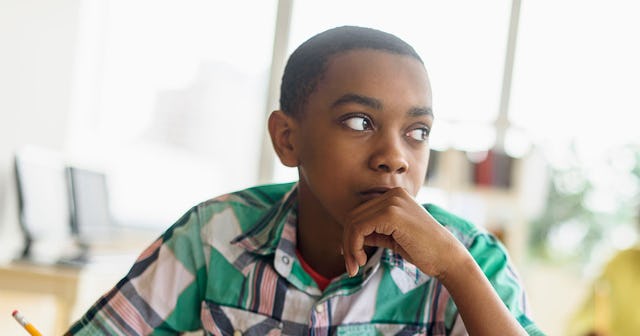The Kids Are All Right -- What It's Like To Raise An 'Anxious' Tween

I’m at the dentist with my sons. They are 9 and 7 ½ at the time. My 9 year-old gets particularly anxious around anything slightly medical. When he was 5, he was hospitalized for a week with a mystery illness. Poked and prodded. He was given an IV so that fluids could be administered around the clock. His blood was drawn every 4 hours. He hated it. I did too. That week left no physical scars, but certainly mental and emotional ones.
To do this day, he gets anxious around any doctor’s visits, even basic check-ups that I promise will not include needles. At the dentist, he was visibly nervous and struggled with various aspects of the appointment, especially the x-rays. At one point, the dental hygienist asks, “Is he on medication for anxiety?”
Taken aback, I replied honestly, “No,” and explained his previous medical experiences and history, the resulting distrust and nervousness around this dental visit and other similar experiences.
Even outside of medical events, though, I noticed that my child was often anxious, prone to nervous outbursts, engaged in fidgets and had ticks reflecting his anxiety.
For a while, I asked myself, “What is wrong with my son?” Then, probably after that dental visit, I found myself reversing the question as I paid more attention to my son’s anxiety, to the things that triggered it.
There was nothing wrong with my son. I flipped the question after I looked more deeply at things: “What is wrong with us? Our society? Our world that I thought the fault lay in my child?”
As parents, my partner and I focused on raising our children to be thoughtful and empathetic, to be children who cared about the world and who cared about others.
My son’s “anxiety” was because we succeeded. He was aware of the world around him. He was full of empathy. If I acted like something was “wrong” with him, then I would only increase his anxieties as he came to internalize his “wrongness.”
Within a single 10-month period, my child experienced: multiple wildfires that required evacuation from his school (a very scary evacuation) and from his home (once with a fire at the end of our street), substantial wildlife and property loss in our community from those fires, and a school shooting at a neighboring school in our town which caused a lockdown at his school, not to mention a good friend starting (out of the blue) to ignore him at school and an increased understanding about how serious climate change is. To go through all of that and NOT feel a little anxious would actually be more concerning to me as a parent. That is a lot of anyone to endure, much less a 10 year-old.
Soon after all of this, the COVID-19 virus hit and we began to shelter-in-place. Additionally, his understanding about the necessity of the Black Lives Matter movement and about continued violence against Black Americans grew. This would be troubling for many children, but more so for a child whose father is Black. He began to pull his hair out, a physical reflection of his anxieties.
This time, though, I didn’t ask myself “What is wrong with my child?” Because I knew the answer now. Nothing. There was nothing wrong with my child. He was engaging with and processing the world around him.
By reminding myself that my son was normal, and sharing this point of view with friends who’d had similar misgiving around their children, I found liberation (and lessened my own anxieties). I could focus my attention on creating a healthy environment for all of us. As a family, we could foster fruitful discussions around the inequities in the world and share how we as parents and change makers approached those challenges.
We set aside time to talk about the state of the world. We focused on stories of hope and joy in response to his specific request for such stories, especially when it came to stories about Black America. “Where is the joy?” He asked one day. “I need more joy,” he told us, and we sat out to find it.
We found a fabulous Black Innovators course on Outschool for him. We set up Imagination Exercise sessions with his Aunt, a Buddhist translator, who leads him through thinly veiled meditation exercises. We make sure and take walks to the park, to go for jogs, to climb trees, to pick up trash in our community.
We empower him to engage and create change around the challenges he sees for powerlessness feeds anxiety like nothing else. He created a video game and committed to donating 25% of all proceeds to Black Lives Matter and 25% to COVID relief funds. He is currently researching homelessness in our community and working on an action-oriented project based on his research.
His hair is growing back in. He has less bald spots. He laughs more. Yes, the world still presents many, many challenges and there is so much to change. But, my kid is not one of the things that needs changing. His empathy for others and his feelings about the world are everything that is right and kind and good in the world, not something that is wrong. My kid is all right.